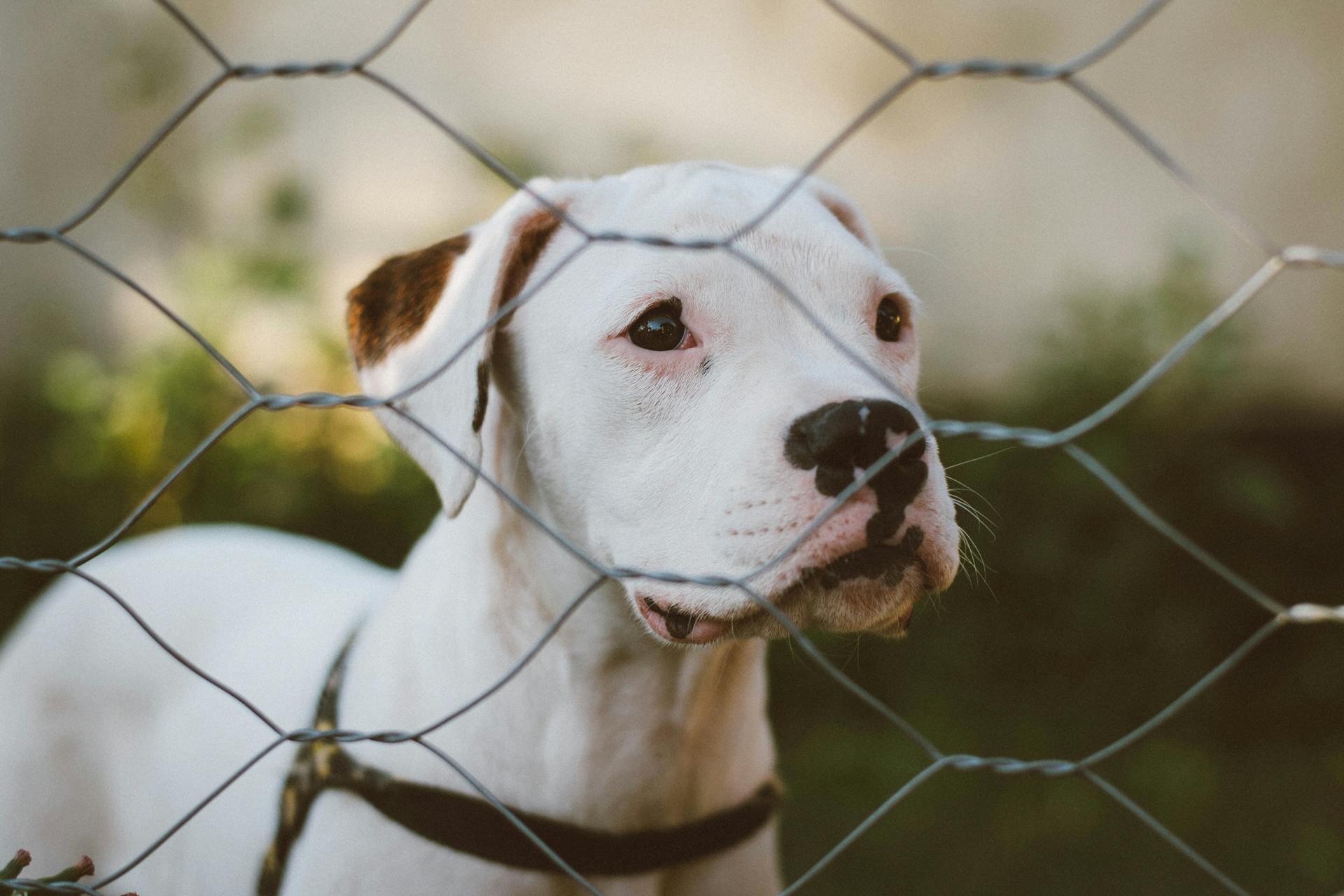
Resource guarding is a common issue in dogs, where they become protective of their food, toys, or even their family members. In the case of a baby, this can be particularly concerning.
Dogs may exhibit resource guarding behavior due to a variety of reasons, including past experiences, genetics, and learning from their environment. Research suggests that dogs that are not socialized properly can develop resource guarding behavior.
Preventing resource guarding in dogs is crucial, especially when a new baby is introduced to the household. One way to do this is to establish a routine and provide a stable environment for your dog. This can help reduce stress and anxiety, which can contribute to resource guarding behavior.
By recognizing the signs of resource guarding and taking proactive steps, you can help ensure a harmonious household where both your dog and baby feel safe and secure.
Understanding Resource Guarding
Resource guarding is a natural dog behavior, but it's not always desirable. Resource guarding is a normal, natural survival behavior that all animals, including people, will display.
Dogs resource guard to control access to a valued resource, which can be something as simple as a toy or as important as food or space. A dog may feel the need to guard food, a bone, a toy, space, another dog or even a human.
Resource guarding can be triggered by various causes, including genetics, training, changes in the household, and scarce resources. Some dogs are genetically predisposed to have trouble sharing and to act in a way that protects anything of value.
Dogs who experience repeated loss of items of value may react by resource guarding going forward. They may have been taught that the only way to keep what they have is to guard it.
A sudden change in the household, such as the addition of a new dog, can also trigger resource guarding in some dogs. Resource guarding can develop as a young dog matures.
Here are some common reasons why dogs resource guard:
- Genetics: Some dogs are genetically predisposed to have trouble sharing and to act in a way that protects anything of value.
- Training: Dogs who have repeatedly lost items of value may react by resource guarding going forward.
- Changes in the household: Sudden changes, such as the addition of a new dog, can trigger resource guarding in some dogs.
- Scarce resources: Dogs who have experienced not having enough food or toys may resource guard as a protective measure.
Recognizing Signs and Behavior
Resource guarding in dogs can be subtle, and it's essential to recognize the signs before they escalate into more intense behaviors. Growling is a clear indication that your dog is resource guarding.
A dog might show less intense signs of guarding behavior, such as freezing, eating faster, or taking an item and moving away. These behaviors can be subtle, but a certified dog trainer or behavior consultant will often notice them before the more obvious signs appear.
Some common signs of resource guarding include intently watching others, stiffening of the body, and putting a paw on the treasure. These behaviors can be a warning sign that your dog is feeling uncomfortable or threatened.
Here are some signs of resource guarding in dogs:
- Intently watching others
- Stiffening of the body
- Putting a paw on the treasure
- Taking the object further away or into another room
- Hovering over the object
- Shielding the item from view
- Frantically and quickly eating the item (if edible) when anyone approaches
- Staring
- Growling
- Tooth displaying
- Snapping
- Biting
A dog growl is not a challenge to you or the dog being mean or bad. They are literally trying to communicate with you without escalating to a bite. Always listen to a growl by stopping your approach, taking a step back, and evaluating the situation so you can avoid it in the future and start treating the issue.
Prevention and Training
Working with a certified dog trainer or behavior consultant is essential to address resource guarding in your dog. They will help you develop a plan to address the behavior and ensure your safety.
Preventing resource guarding in puppies is easier than treating it in adult dogs. Teach your puppy to be happy when someone approaches their treasure by tossing treats into their bowl.
To prevent resource guarding, teach your dog to associate the approach of a person with treats. Walk towards your dog and toss a treat into their bowl, then pick it up and deliver another treat. This should be done quickly, within a few seconds.
Managing situations to avoid opportunities for resource guarding is crucial. Remove and hide items that trigger the behavior, and avoid approaching your dog when they have food or a chew toy.
Teaching your dog to drop it and leave it is essential for preventing resource guarding. Start with toys and then move on to food trades, rewarding your dog with something equal or better.
Explore further: Do Dogs like the Taste of Dog Food
A reliable recall can help prevent resource guarding. Train your dog to come when called, and use this cue to avoid approaching them when they have something they're guarding.
Never punish a growling dog, as this can escalate the behavior. Instead, listen to the growl by stopping your approach and taking a step back.
Managing and Changing Behavior
To change your dog's resource guarding behavior, you need to start with management. Be extra observant of your puppy's behavior and make a list of times you see him exhibiting even mild tension in the presence of valuable resources.
The goal of management is to prevent escalation of tension during the learning process. This can be achieved by taking steps to prevent your dog from getting into situations that trigger guarding behavior.
For example, if your puppy guards his food bowl, you can try feeding him in a quiet room away from other pets and people. You can also try feeding him at a slower rate to prevent him from feeling anxious or possessive.
Curious to learn more? Check out: 6 Month Old Puppy Resource Guarding
If your puppy's guarding behavior is mild, it may resolve on its own as he learns better social skills. However, if it's moderate or serious, you'll need to use behavior-modification protocols to help him change his behavior.
One useful tool for modifying resource guarding behavior is called Counterconditioning and Desensitization (CC&D). This involves teaching your dog to associate the presence of another dog or person with good things, such as treats.
Here's a summary of the CC&D process:
- Start by having another dog at a distance that doesn't trigger your puppy's guarding behavior.
- Feed your puppy high-value treats while the other dog is present.
- Gradually increase the proximity of the other dog over time.
- Reward your puppy for remaining calm and not guarding his resources.
By following these steps, you can help your puppy learn to associate the presence of others with good things, rather than feeling anxious or possessive.
If your puppy's guarding behavior is serious, it's best to seek the help of a qualified, experienced force-free professional. They can help you develop a customized behavior-modification plan that's tailored to your puppy's specific needs.
Remember, changing your dog's behavior takes time, patience, and consistency. But with the right approach and support, you can help your puppy learn to manage his resource guarding behavior and live a happier, healthier life.
Living with Resource Guarding
Living with resource guarding can be challenging, but it's not uncommon for people to choose to live with it. Predictability is key, and many owners know exactly when to expect the behavior.
Some households are more suitable for living with a resource guarding dog than others. A single person who rarely entertains is in a better situation than a family with multiple children who have frequent playdates.
Avoiding situations that trigger problem behavior is crucial, especially if your dog is at risk of causing injury. This can be done by preventing situations that trigger aggression.
Preventing situations that trigger problem behavior is a must, especially if your dog is at risk of causing injury. You can also use behavior modification to alter how your dog behaves when they have something of value.
Life with a dog who allows anyone to take anything away from them is indeed easy, but that's a lot to ask of even the sweetest dog.
When to Seek Help
If your dog has bitten due to resource guarding, it's essential to seek professional help right away. This is a serious issue that requires the attention of a qualified canine behaviorist or dog trainer.
Resource guarding behavior can be stressful to live with, and it's best to address it before it gets worse. In some cases, just knowing how to manage situations can make all the difference.
Even if there haven't been any injuries, it's still a good idea to seek professional help if you want to improve your dog's behavior. A qualified expert can teach you how to prevent resource guarding problems from arising.
If there are children in the household, it's crucial to seek help to ensure everyone's safety.
Frequently Asked Questions
What to do if a dog growls at a baby?
Immediately separate the dog and child, then avoid punishing the dog for growling to prevent escalating the situation
Will a dog resource guard a person?
Yes, a dog can resource guard a person, not just objects, and may exhibit subtle warning signs before escalating to growling or aggression. If you suspect your dog is resource guarding a person, it's essential to seek professional help to address this behavior.
Sources
- https://www.preventivevet.com/dogs/resource-guarding-in-dogs
- https://www.thewildest.com/dog-behavior/resource-guarding-dogs-solving-troubling-problem
- https://rsdtraining.com/so-you-say-your-dogs-a-resource-guarder/
- https://demarinisdogtraining.com/resource-guarding-in-dogs/
- https://www.whole-dog-journal.com/puppies/resource-guarding-in-puppies/
Featured Images: pexels.com


